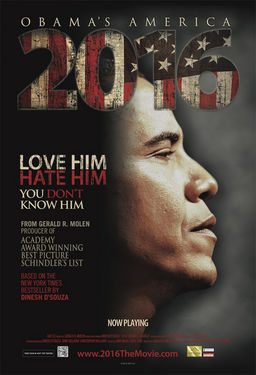
Conservative scholar Dinesh D’Souza has, with the help of Gerald Molen (Schindler’s List) and John Sullivan, produced a documentary entitled 2016: Obama’s America, which was recently released in Texas and is now being presented at some 400 theaters across the country. The film persuasively projects a frightening future for America: emaciated in military power, weakened financially, with diminished allies such as Israel in a world increasingly dangerous and threatening.
D’Souza starts out by proving his status not as an ideologue but as a patriot with roots in India who loves the opportunities this country has given him that would scarcely be possible back home. He persuades his audience that he seeks only to understand how a man such as Obama, with so many similarities to himself (born in the same year, married in the same year, attended Ivy League schools at the same time) could come out with such a different, even radical, point of view about America.
Based on his two books about Obama (The Roots of Obama’s Rage and Obama’s America), D’Souza’s documentary concentrates on Obama’s autobiography, Dreams From My Father, and begins with the thesis that because it is not entitled Dreams of My Father it provides an essential clue into that thinking: that Obama has internalized the anti-colonial ideology of a man he scarcely knew.
In an interview with The Christian Post D’Souza observed,
One of the themes in the movie is the anti-colonial goal of downsizing America in the name of global justice. So the core idea here is that America has become a rogue nation in the world and also that America enjoys a standard of living that is unconscionably high compared to the rest of the world. So anti-colonialism is a program of global reparations…. It’s reparations for global injustice. Obama’s goal is to shrink America.
There are significant gaps in the movie that cry out for remedy and explanation. First, there is a persuasive argument put forth by Jack Cashill, in an article he wrote at the American Thinker, making the case that communist radical Bill Ayers ghost-wrote the book for Obama. The movie says nothing on the matter but accepts Obama’s autobiography at face value.
Second, D’Souza avoids any “birther” controversy by noting only that Obama’s birth was recorded by two newspapers in Hawaii, and that that is good enough for him.
Third, D’Souza fails to mention any of Obama’s background as a community organizer or as a follower of Saul Alinsky, author of Rules for Radicals.
But to give him credit, D’Souza goes into great detail about the impact other radicals have had on Obama’s thinking, including an especially revealing look at his relationship with his pastor, Jeremiah Wright, whom Obama tried to silence with a payoff of $150,000. D’Souza uses that incident to explain why Obama worked so hard to keep that relationship under wraps, as it would destroy the “good guy” image he diligently cultivated on his way to the presidency.
Also mentioned are Frank Marshall Davis — whom Obama repeatedly refers to in his autobiography as “Frank” — the hard-core communist revolutionary, as well as Edward Said, the violently anti-Israel Columbia professor who informs Obama’s favorable views on Palestine.
As the movie ends, one is left with a feeling of anger and frustration that someone with goals and purposes and agendas so totally anti-American has been elevated to such a position of power and influence. And that is probably the film’s weakest link: D’Souza fails to mention any of the other powers behind the scenes in Obama’s surprisingly rapid rise from obscurity to preeminence in such a short period of time. Numerous questions are unanswered: Who vetted him? Who pushed Hillary Clinton out of the way to make way for him? Where is George Soros in all of this? What about the obvious influence of the world-government-promoting Council on Foreign Relations in his administration?
But D’Souza also answers vital questions as well, including the key one: If Obama is reelected, what will America look like in four years?



